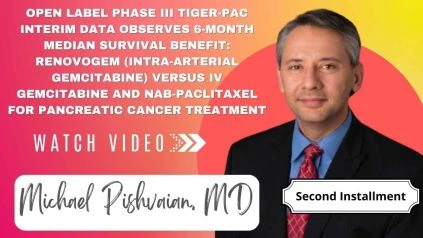Open Label Phase III TIGeR-PaC Interim Data Observes 6-Month Median Survival Benefit: RenovoGem (Intra-Arterial Gemcitabine) Versus IV Gemcitabine and nab-paclitaxel for Pancreatic Cancer Treatment
By Micheal Pishvaian, MD, PhD
How does this data compare to what you have seen, historically, in patients with locally advanced pancreatic cancer?
Locally advanced pancreatic cancer is really a stage of cancer that has only been defined in the last maybe 10 or 15 years. If you look back to the early 2000s, and certainly before then, many of the patients with what we would now define as locally advanced unresectable pancreatic cancer, were lumped in with patients with metastatic pancreatic cancer in clinical trials. And so the outcomes were often grouped together. I remember distinctly, it was actually probably the early 2000 teens that the NIH started to make a request that we separate these subgroups of patients because their outcomes are distinctly different. And now we see a fairly homogeneous outcome for patients with locally advanced pancreatic cancer, where they’re meeting overall survivals are somewhere in the range of 12 to 15 months better than patients with metastatic disease but unfortunately still way too short for this patient population. So if these results bear out for the TIGeR-PaC study, this could be something that would really push that level up into the 18 to even 20 month range. The 10 month versus 16 month overall survival that was seen in the interim analysis does not include the four months of induction therapy that the patients are getting. So essentially from the time of diagnosis, it’s really 14 versus about 20 months, and so if we are able to see in a large phase III study, a 20 month or even close to 21 month median overall survival for patients with locally advanced pancreatic cancer. That would definitely be an improvement over what we’ve seen over the past 10 or 20 years.
Watch and Share the First Video Here: https://oncologytube.com/v/41893
How important is it for eligible sites to offer patients the opportunity to participate in the TIGeR-PaC clinical trial?
We’re hopeful that this interim data will get physicians and patients more excited about participating and enrolling patients in the TIGeR-PaC clinical trial. There we’re expecting results to be out by 2024. Obviously, if enrollment picks up and we could report that out sooner, that’d be fantastic. But we’re hoping that the energy and the excitement about this interim analysis will lead to more patients wanting to participate in and hopefully getting treated as part of this study.
Michael Pishvaian, MD, PhD – About the Author, Credentials, and Affiliations
Michael Pishvaian, MD: A Renowned Oncologist and Researcher in Precision Medicine for Pancreatic and Colorectal Cancer Treatment
Dr. Pishvaian is an Associate Professor at the NCR Kimmel Cancer Center at Sibley Memorial Hospital and Director of the Gastrointestinal, Developmental Therapeutics, and Clinical Research Programs at the Johns Hopkins University School of Medicine. Prior to his current position, he held a similar role at the University of Texas, MD Anderson Cancer Center, where he was also Co-director for Clinical Research at the Sheikh Ahmed Bin Zayed Al Nahyan Center for Pancreatic Cancer Research. Dr. Pishvaian earned his MD and PhD in Tumor Biology from Georgetown in 2001, where he also completed his medical residency and fellowship in Hematology/Oncology. His research focuses on precision medicine for patients with pancreatic and refractory colorectal cancer, with a particular emphasis on targeted therapy for homologous recombination DNA repair deficient tumors. Dr. Pishvaian is also a co-investigator on an NIH RO1 studying resistance mechanisms to PARP inhibitor-based therapy.

